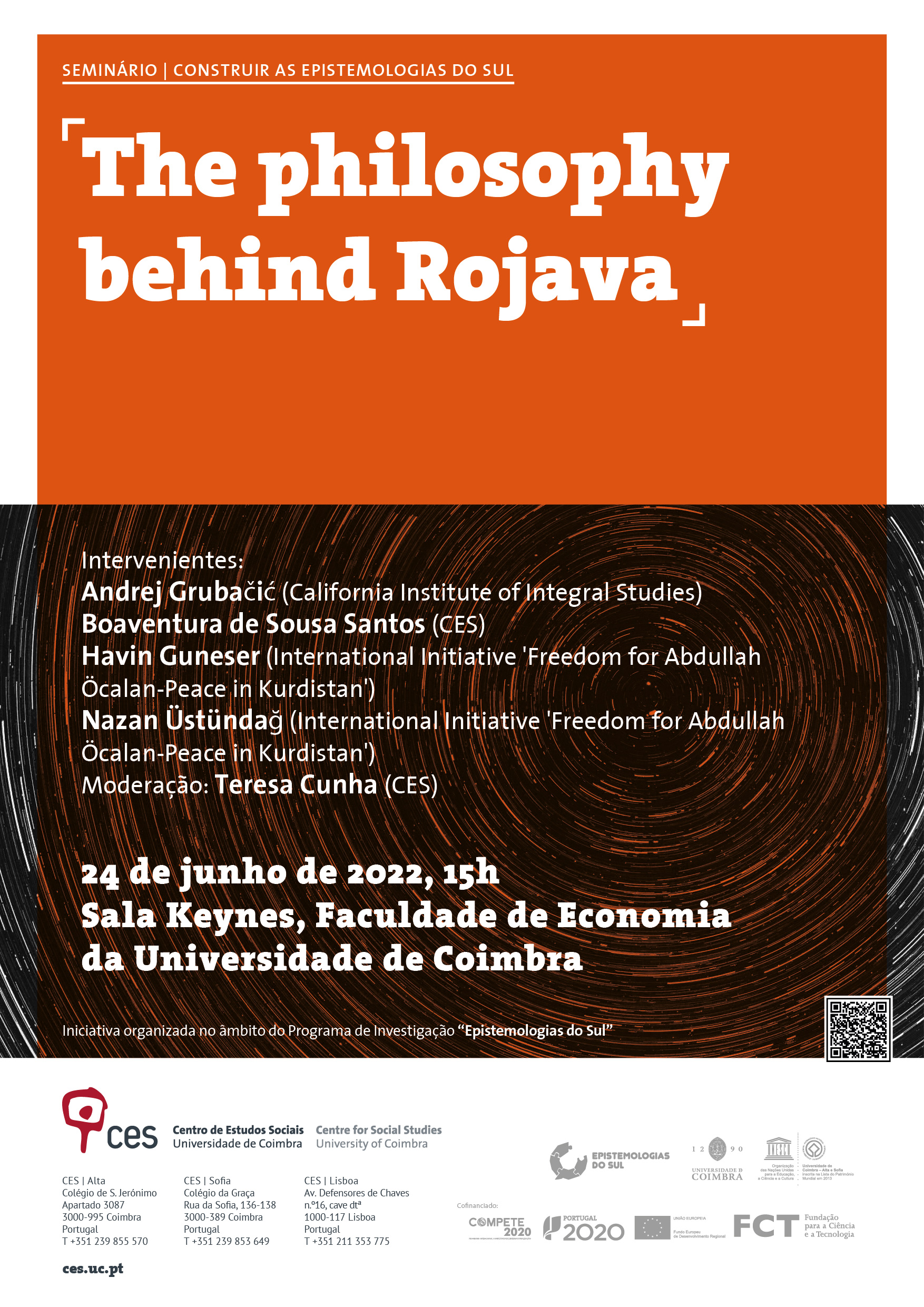Seminário | Construir as Epistemologias do Sul
The philosophy behind Rojava
24 de junho de 2022, 15h00
Sala Keynes, Faculdade de Economia da UC
Moderação: Teresa Cunha (CES)
Apresentação
In Rojava (Democratic Federation of Northern Syria) a revolutionary project has been ongoing since 2011. This project of a horizontal democratic system with an ecological and feminist emphasis has, as a basis, a vision of democratic nation, or multi-ethnic federation without nationalism. Other concepts, such as the liberation of women, direct democracy, and social ecology are equally fundamental to this project.
The Kurdish political project has a philosophical background that has been developed over four decades. It has arisen as a democratic response to the continued repression and invisibilization by states and governments in the Middle East. The Kurdish alternative to this dismal state of affairs is the project of Democratic Confederalism, a stateless democratic federation. What is the philosophy behind the Rojava project? How was it developed and what are its theoretical bases? Can Kurdish lessons be used in other contexts?
This seminar aims to be in dialogue with the ideas and experiences of the Kurdish Movement. We will focus Democratic Confederalism and the alternatives to the capitalist political model put in the place of the state. We will discuss the paradigm of women's liberation as well as other concepts central to the contemporary Kurdish radical thought, including the ecological and communal economy, municipalism and self-defence.
Notas biográficas
Boaventura de Sousa Santos | Professor Catedrático Jubilado da Faculdade de Economia da Universidade de Coimbra e Distinguished Legal Scholar da Faculdade de Direito da Universidade de Wisconsin-Madison e Global Legal Scholar da Universidade de Warwick. É igualmente Director Emérito do Centro de Estudos Sociais da Universidade de Coimbra e Coordenador Científico do Observatório Permanente da Justiça.
Nazan Üstündağ wrote extensively on social policy, gendered subjectivities and state violence in Kurdistan. She has also worked as a columnist in the journal Nokta and the newspaper Özgür Gündem. Her opinion pieces appeared in venues such as Bianet, T24, Roar Magazine and Jadaliyya. Üstündağ is a member of Women for Peace and Academics for Peace. Most recently, she is finishing a book manuscript with the working title “Mother, Politician and Guerilla: The Emergence of A New Political Cosmology in Kurdistan Through Women’s Bodies and Speech”.
Havin Guneser is the author of The Art of Freedom: Brief History of the Kurdish Struggle (PM Press 2020). She is an engineer, journalist, and women’s rights activist who writes and speaks extensively on the topic of revolution in Rojava. She is one of the spokespersons of the International Initiative “Freedom for Abdullah Öcalan—Peace in Kurdistan” and translator of several of Öcalan’s books.
Andrej Grubačić is the Editor of the Journal of World-Systems Research and the founding Chair of the Anthropology and Social Change Department at the California Institute of Integral Studies in San Francisco. He taught at the university of Rojava and he is the author, most recently, of Living at the Edges of Capitalism: Adventures in Exile and Mutual Aid (UC Press, 2016), co-authored with Denis O’Hearn and awarded the 2017 American Sociological Association prize for Distinguished Scholarship.
Iniciativa no âmbito do Programa de Investigação «Epistemologias do Sul»


